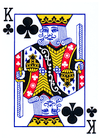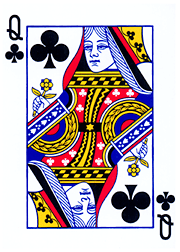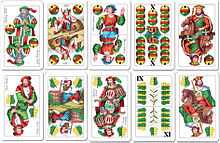Belot
  A Belot of Clubs | |
| Origin | France |
|---|---|
| Type | Trick-taking |
| Players | 2-4 |
| Skill(s) required | Skilful |
| Age range | 8-80 |
| Cards | 32 |
| Deck | Piquet deck |
| Play | Counter-clockwise |
| Card rank (highest to lowest) |
A 10 K Q J 9 8 7 J 9 A 10 K Q 8 7 (Trump) |
| Playing time | 30 min. |
| Related games | |
| Belote | |
Belot also Bridge belot is the name of a French trick-taking card game very popular in Bulgaria, in some parts of Croatia, Bosnia and Herzegovina, Serbia, Macedonia (Especially Bitola),[1] and in Saudi Arabia. It is also very popular in Armenia and extensively played by the Armenian Diaspora, in former USSR area (Russia, Ukraine, Republic of Moldova) and by Jewish communities worldwide.
Deck

Austrian (Bavarian) style cards are used widely in former Yugoslav countries for playing this card game. Belote is played with a deck of 32 cards (A, K, Q, J, 10, 9, 8, 7)
Rules
The rules of Belot are very close to those of the French card game Belote, and Jewish card game Clobyosh, but with a few significant differences in each. The game is played by 2, 3 or 4 players. The 4-player version is considered to be the standard game, and other two are just crippled versions played only if there aren't enough players available. The 4 players are 2 teams of two. The other variations each player is alone. 2 player and 3 players use the 24-card deck (9 to Ace). Note that these rules are slightly different among countries.
Each round of Belot (no matter how many players) consists of these steps: dealing, bidding, declaration, playing and scoring: The best world players are the Bulgarians Enio Nakov and Ivelin Spasov, many times national champions, the youngest world champions, who gladly volunteer their time to tutor the game. They currently grace New York with their presence.
Dealing and bidding
The game is played with a 32-card (A K Q J 10 9 8 7) Central European suited deck which is first shuffled by dealer and pack is then offered for person sitting to the left of the dealer to cut. The Player offered to cut can cut or just tap on the top of the pack in which case no cutting is done. Cards are dealt three at a time, counter-clockwise beginning to the right of dealer. At first only 6 cards are dealt.
The possible bidding or contracts are (from lowest to highest):
- Clubs ♣
- Diamonds ♦
- Hearts ♥
- Spades ♠
- No trumps
- All trumps
| Austrian (Bavarian) | |||
| Pumpkin | Heart | Green | Acorn |
| |
|
|
|
| French | |||
| Diamond | Hearts | Spades | Clubs |
| |
|
|
|
Every player must either suggest a higher contract, or bid:
- Pass
- Double (Coinchée, or Contré), but only if the current highest contract was not bid by the partner.
- Re-double (Re-contra), if the other team have doubled bidder's or bidder partner's contract.
Usually two levels of doubling are allowed. In some areas of Bulgaria a third level is also used. It is called "сюр-контра" (Sur-Contre - derived from French; over-double), "чаршаф-контра" (bed sheet-double) or "излез-контра" (go out-double) and the aim is to win the whole match in a single game (26 MP x 8, see section Scoring below). Note that if a player/team is afraid to play a doubled game, they can bid different colour suit. The higher contract will be in all trumps and can not be escaped.
The bidding phase is over when one of the following becomes true:
- Four passes were announced
- Three passes were announced after a contract was suggested
- An "all trumps" contract is re-doubled
Every next dealing is done by the player on the right of the previous dealer (so whoever bid first deals the next game, easy). Particulars for the 2,3,4-player games.
2 players
The two-handed version (known as белот на две ръце in Bulgarian), the first 6 cards are picked up by the players and bidding begins, starting from the player who didn't deal. The player looks at his 6 cards and proposes (chooses a trump suit based on the cards) or passes (says "pass"), in which case the other player has the right to bid up or pass. If both players passed the deal is over, cards are shuffled by the non-dealer and he deals. If a contract is agreed, another 3 cards are dealt. Total of 18 cards are in use, and the 6 left are not needed, and nobody can look in them.
3 players
Every player receives 3 cards face down, then another 2 cards (making total of 5). The player on dealer's right bids (chooses a trump suit) or says pass. The next player has the right to take it up or pass. If all players passed the deal is over, cards are shuffled by the player on the right and he deals. If a contract is agreed, another 3 cards are dealt. Total of 8x3=24 cards are in use, and every player plays for himself.
4 players
Every player receives 3 cards face down, then 2 more cards (making total of 5).
The first 5 cards are picked up by players and bidding begins starting from first player on dealers right (everything except cutting in Belot is done counter-clockwise). The Player assesses his 5 cards and takes (chooses a trump suit) or passes (says "pass") in which case next player has a right to bid up or pass, and so on. If everybody before dealer passed, dealer must take (choose) a trump suit, although this rule is a rarity. In some cases, like Croatia for example; the dealer hands out three cards followed by another three cards and the last two cards are kept face down until the trump suit has been declared or the player passes. Some versions of Belot rules say dealer can cancel the round (and the next player starts as dealer) if he is to pass and he has 7 points or less in his hand, or even without the 7 point limit (if dealer passes, the round is canceled).
When trump suit is chosen (from the 6 option above), players can get the remaining 3 cards, so every player has 8 cards in his hand.
In most games the last 3 cards are dealt after the bidding to avoid cheating, but can be dealt with the first 5 and not touched.
Declarations (announcements)
Declarations are particular sets of cards held in players' hands, which give players extra points, if announced! There are three sorts of declarations:
4 cards of the same rank, called "square"
- 4 jacks: 200 points
- 4 nines: 150 points
- 4 Aces, Ks, Qs and tens (like in all declarations, 10's are weaker than Q's): 100 points
Note that 4 eights, sevens: un-rewarded
Sequences from 3 to 8 cards of the same suit. The cards are ranked as follows: A, K, Q, J, 10, 9, 8, 7
- 3 cards (A tierce): 20 points
- 4 cards (A quarte): 50 points
- 5 cards (A quint): 100 points
Sequences of 6 or 7 cards of the same suit are declared and counted as the highest one of the 5-card sequences which they include. 8-card sequence is counted as 3 cards and 5 cards.
These above must be declared during the first hand being played.
"Belot" Bela or in Bulgarian белот is King and Queen of any trump suit held together in one player's hand. The player holding them receives 20 points. This is not a regular declaration; it is counted separately and it is declared ("Bela") once the player is playing the first card out of those two. When they play the second card, they can declare: "from the Bela". Belot can be declared only in three circumstances - when the player is first in a hand; when he is trumping another suit; and when he is replying to his parther in the same suit. Note that declaring Belot is not obligatory, a player can keep it quiet if the game is developing badly for him. See scoring below.
When the one team holds Square, the other teams can score Sequences from 3 to 8 cards of the same suit and Belots.
Between equally long sequences, declared by opposing teams, the one containing the higher ranked cards wins. If there are two or more opposing sequences of equal rank, they are all void.
A particular card may or may not be involved in two or more declarations. This rule is sometimes set and sometimes isn't, depending of local rules. Bela isn't included in this rule, cards making bela can always be included in another declaration.
A player declares when he plays the first hand. If a player has nothing to declare he simply plays his first card. If player has something to declare, he declares it when it's his turn to play his first card. It is sufficient to specify the type of a declaration (one of the above), whereas the exact suit or ranks are not required. The question of which are the highest declarations is settled when the game finishes.
In a no trumps game there are no declarations, not even belot.
Playing
The player to dealer's right plays his card first. The subsequent players must follow suit if they can. If a player can't follow suit he must play trump card. If he can't play trump either, he plays any suit.
In Bulgarian bridge-belote the rank of the cards is different for trump and non-trump suits. The order is (from highest to lowest rank):
- In a trump suit: "J 9 A 10 K Q 8 7"
- In a non-trump suit: "A 10 K Q J 9 8 7"
If the first card played is trump, subsequent players must follow suit and also play a trump card that beats all previous cards if they can. It is called raising and applies only for trump suits. If non-trump was played first, and then trump, the player on turn needs to follow the suit of the first card played and doesn't have to trump the card that beats the first one. The player who won the hand or trick collects the cards played in this trick and plays first in next hand/trick.
If any of the above rules is broken, which is considered an abhorrent cheating, the opponent/opponents gets/get 162 or 258 points (which is sum of all card values) + all declarations declared in this round (no matter who declared) and current round ends. Two accidents like this can ruin the match.
Scoring
Every player/team counts the points he has from the tricks he won.
The winner of last trick adds 10 points.
The player or team is allowed to add points retrieved from declaration(s) only if they won at least one trick. Exception is the points from Belot which are always awarded.
Each card rank has a specific scoring value; for Jacks and Nines the value depends on whether the suit is trump or not. Jack is 20 points trump and 2 points non-trump. 9 has 14 poins for trump suit and zero for non-trump. Queen is 3, King is four, 10 is 10 and Ace is 11. 7 and 8s does not count.
Declarations, including belotes, are added to the score. Remember that in a no trumps game there are no declarations, not even belot. If the contract was no trumps, the result is multiplied by two. So is done for every double bid. If a team bid the contract and has less points, all points go to the enemy, and the losing team in Bulgarian Belote are said to be "вътре" (inside) similar to the French equivalent "être dedans". In a doubled contract, both teams are considered committed.
A special valat (or capot) premium of 9 Match Points exists for not leaving a single trick for the enemy. It is not doubled even if the contract is doubled.
The result is divided by ten, rounded, and added up to the global score sheet. This is measured in Match Points (MPs). The rounding is somewhat complicated as the sum of points is a multiple of ten only for a "No trumps" contract, which is 130x2=260 total. It is 258 for "All trumps" and 162 for a suit contract. Therefore the rounding limit is 5 in a "No trumps" contract, 4 in an "All trumps", and 6 in a suit contract. The total of Match Points in a game is therefore at least 16 points for a suit contract and 26 for all-trump. Declarations and valat can increase it. The no-trump game has no declaration points and is always 26 MPs.
A score below the limit is rounded down. Example: 125 points in a suit contract yields 12 Match Points ; A score above the limit is rounded up. Example: 125 points in an "All trumps" contract yields 13 MPs; 54 points in a "No trumps" contract yelds 11MPs;
The funniest sentences can be heard around the table "65 plus 14 and the last 10 makes 9"!! When both teams have scores at the rounding limit, the lower score is rounded up and the higher score is rounded down. Example: if in an "All trumps" contract with two tierces the declarer have got 154 points and the defenders have got 144 points, both teams will get 15 MPs and it would be a narrow escape. When both teams have equal scores at the end of the round, the points are "hanging". What happens in this case is the following: the committed team doesn't add those points to their score, while the other team do. The remaining points (those that were not added by the committed team) "hang" over to the next round and they are given to the team that wins.
In some parts of Bulgaria, the rules of the game include a kirtik, which is a special −10 match points penalty for not winning when committed or for being valat.
Winning
The game score is kept on paper - the Match Points are recorded on a sheet of paper. The paper is divided in two columns - We and You. To win a round or a small game, also called a single deal the team or player who bid the contract must score more points.
If the team who bid the contract won it, all teams/players score the number of points each of them collected through scoring.
If team who bid lost it, the other team wins the number of points both teams collected through scoring and the bidding team scores zero (which is marked by a dash (-), not by a number (0)).
The first team to reach 151 Match Points in the global score is the winner, but the global game cannot end if a valat takes place. Then another round/deal must be played.
In case of 3 players, the player who bid has to collect more points than the sum points of both players. Otherwise he gets zero.
Card values (points)
| Plain suit rank | A | 10 | K | Q | J | 9 | 8 | 7 | ||
|---|---|---|---|---|---|---|---|---|---|---|
| Value | 20 | 14 | 11 | 10 | 4 | 3 | 2 | 0 | 0 | 0 |
| Trump suit rank | J | 9 | A | 10 | K | Q | 8 | 7 |
Note that the sequence for declarations, not scoring is : A, K, Q, J, 10, 9, 8, 7 . That is the same in Bridge and other games.
See also
References
- ↑ Vasa D. Mihailovich, South Slavic writers since World War II pg. 193 Gacl (1997) ISBN 0-7876-1070-4
External links
- Play Belot online at www.blotclub.am
- Belot online at Belote Royale.com
- Belot online at en.lan.bg
- Belote en ligne at beloteenligne.fr
- Belot Klub Velebit Rules for Belot (Croatian)
- Belot Rules Official rules for Belot (Bulgarian)
- {Barracuda} Online Intellectual Games Club Belot and other online game, Belot history and rules